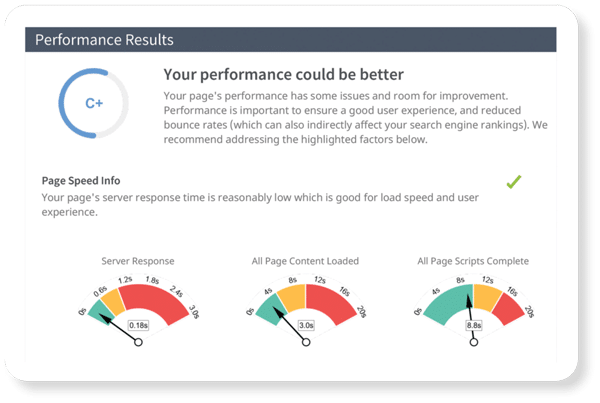When Google puts out an algorithm update, every SEO and site owner out there only has one initial response: Fear. That fear is only natural; an algorithm update means the potential for your website to fluctuate — perhaps negatively — in the SERPs (Search Engine Results Pages). With each algorithm update, many websites stand to lose, and many others stand to gain. Some are even unaffected.
For example: Last week, Google announced an update it is calling one of the biggest in 5 years. According to Google, the BERT Update will improve search results for one in 10 English-language searches. In effect, BERT will help Google crawlers understand natural language in the context of more conversational search phrases.
At MyAdvice, we write for people. Our writers and optimizers have long focused SEO and content strategies for clients on capturing first-page results for both high-value keywords and conversational or long-tail search phrases that use natural language. More and more online searches are starting not only to sound, but to look like voice search queries.
As results from the BERT update emerge, MyAdvice will continue to monitor performance and offer solutions for better rankings.
Google has said there is no “fix” for pages that fall in ranking due to an algorithm update. However, understanding what an algorithm update is and what Google is trying to achieve with them can help you future-proof your SEO efforts.
What Is a Google Algorithm Update?
Google uses a complex system of signals and algorithms to deliver webpages to a searcher based on the keyword or query entered. Google makes changes to these search algorithms thousands of times per year, and while most of them aren’t noticeable, major updates — often called “broad core algorithm updates” — make significant changes to the SERPs.
A broad core update encompasses many changes, so it’s hard to pinpoint exactly how or why a site’s rankings may have changed, or why they haven’t. Think of algorithm updates as little tweaks in the code — changing one tiny thing, as Google does multiple times per day, won’t have as large of an impact as changing a lot all at once.
Among SEOs and site owners, the broad core updates are the ones that cause the most concern. As stated, the announcement — or the surprise of — an algorithm update causes mass panic in the community. Why is that?
Nobody Knows What to Expect
Google’s algorithm updates are unpredictable and oftentimes virulent. One day, your site ranks on the first page; the next, you’re on the second or even third. Such fluctuations are common in broad core updates, which lends credence to the panic. On top of that, Google is vague about what it changes, and for good reason — if everybody knows the secret to ranking on the first page, then there isn’t much of a point to Google trying to deliver the most relevant sites for a given search query. That is, of course, Google’s end goal — providing the most authoritative information for the entered keyword and, thusly, providing the most positive user experience it can.
While in the past broad core algorithms were a poorly kept secret — many webmasters would check on their stats only to see huge drops or gains when compared to their previous check-in — lately Google has taken to Twitter to announce updates before they happen, as seen with the June 2019 Core Update. Still, despite the recent trend of transparency, no one knows what exactly has caused their rankings to fluctuate. What makes your site more authoritative than your competitors’? On the inverse, what makes their sites more relevant than yours?
For many sites, falling down in the SERPs can mean a loss of leads and, therefore, a loss of business. Because nobody knows what to expect or what changed, that makes the task of reclaiming your lost rankings incredibly daunting. On top of that, and, as previously stated, Google says that there isn’t a fix for pages that fall after an update. Google claims that there is nothing wrong with pages that perform less well; the changes benefit pages that were previously under-rewarded for their efforts.
Don’t Act on the Panic
Before sitting down to analyze your site and attempt to fix the problem, it’s important to remember that acting on the post-algorithm update horror likely won’t help your site. Before thinking to yourself that action needs to be taken immediately, it’s important to remember that panic has never helped anybody before and that letting the waters clear before taking action is the safest bet.
The first days after an algorithm update are typically the worst — keywords may fluctuate rapidly, seemingly without reason. We keep an eye on these fluctuations and take action accordingly. So, what do we do?
Check your site and keyword rankings. The first response we have to any algorithm update is to double-check that your pages and keywords are where you want them to be. If they are, that’s wonderful, and we will keep doing what we were doing before to maintain momentum. If not, it may be time to revisit your site’s content.
Reassessing your site’s content can provide some insight as to why your rankings may have dipped. Google’s algorithms reward strong, recent, and authoritative content. When looking at your content, we ask ourselves the following questions:
- Is the content old, outdated, or does it provide inaccurate information?
- Is the content insubstantial or sparse?
- Is the content rife with spelling errors or grammatical issues?
- Does your content display poorly on mobile devices?
- Is your content based around what you think people might be searching, and not the keywords they’re actually looking for?
- Is the content something you would hesitate to share with a friend, family member, or otherwise recommend?
If we answer yes to any of these questions, then it might be time to rewrite the content in question. Google itself provides a handy list of things to do to improve your content as well.
Look for other opportunities and areas of improvement. While the phrase “content is king” is thrown around frequently in the SEO world, there are other factors that could be contributing to your loss of traffic. Once we’ve rewritten your old content, we like to look at the following factors:
- Do you have a healthy backlink profile? Links to your site from spammy, low-authority sites can hurt your website more than they can help it. Having many unique backlinks can help, but ideally these should be from high-authority websites.
- Does your website have tons of broken links and 404 errors?
- Is your website slow, especially on mobile? Google penalizes sites that are slow — and, from a user’s standpoint, a slow site provides an especially poor user experience, making conversions far less likely.
- Do you have bad reviews, or almost no reviews at all? Reviews send a social signal to Google telling the search engine how relevant your website is. If you sell goods or offer services, it’s a good idea to make sure you’re getting reviews. If you have bad reviews, don’t panic — a bad review isn’t the end of the world. In fact, it is recommended that you respond to every review, whether to thank a positive reviewer or ask a negative reviewer how you can help fix the problem. Google sees responses to reviews as a business engaging with its customers, and as a result, will consider you more of an authority against your competitors who don’t do the same. Additionally, from a customer’s standpoint, responding to reviews and showing excellent customer service skills is sure to bring in good word-of-mouth.
- Is your site properly utilizing XML sitemaps?
Our Advice? Don’t Worry — We’re Here For You
While Google’s core algorithm updates can be daunting, terrifying, and incredibly concerning, there’s no need to panic. There are a number of steps we take to ensure that, should an algorithm update negatively impact you, your site regains lost traction.
If you’re concerned about how your website is ranking, or you simply feel that the task of trying to catch back up after an update is too daunting, feel free to give us a call!






